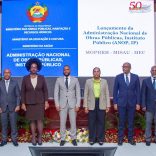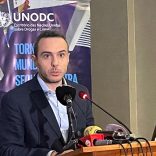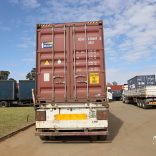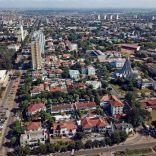Mozambique paid US$40.37 million in interest on 'hidden debt' Eurobonds up to March
Mozambique: Investments in Palma are not in danger

DW (File photo)
Attacks in Palma may repel investment, but not large-scale ones like gas exploration, says Paulo Wache, a geopolitical expert who believes then attacks are aimed at creating tension and destabilising the government.
Palma and Nangade, in the province of Cabo Delgado, northern Mozambique, are the latest targets of attacks by unidentified armed groups, with five dead and about 11 wounded last Sunday (14.01) in the Palma district. In addition, the group vandalised about sixty houses, burnt several stalls and attacked state buildings.
Meanwhile, in Nangade district, an assault on a health centre this Monday (15.01) resulted in two dead, one a doctor. The attackers vandalised the health post, burned some goods and stole drugs.
DW Africa interviewed Paulo Wache, analyst and professor of geopolitics at the Institute of International Relations in Mozambique, regarding the proportions the case is taking on.
DW Africa: Do you find it acceptable that after more than three months since the first attack in the province, the police have not clarified who the attackers are?
Paulo Wache: I think that a ‘de facto’ exercise must be carried out to bring about full clarification, but it must be said that there are other related incidents that happened even before October, for example, the attack on the police station in Niassa, which was promptly clarified because it was an isolated local case.
These cases are always difficult to explain. I presume that it is very difficult to identify the culprits, precisely because there is probably not enough evidence for the police. I think that is why they are not saying, so to not create unnecessary panic, to the point of creating further insecurity.
I think the central element here is identifying who the authors are, identifying their reasons, identifying their ideology, if in fact there is any ideology behind this – all those elements. And it probably will take a little more time to figure it out.
I also think that there might be a certain opportunism on the part of these groups, and this may also be hindering their identification. Small, mobile, uncontrolled groups which, following the first attack, replicate the approach for their own advantage. I do not believe that this is something organised by a permanent group, nor that there is coherent leadership of the attacks they carry out, but there are transitory motives looking for opportunities. I think that up to now it’s about copycat crimes, perhaps because, so far, those who should be being sanctioned, are not.
DW Africa: So the sovereignty of the country is still not at risk?

PW: No. What I think is that there are multiple levels of security. I will identify two. The main level of security is public safety, which is to say, dealing with crime, which is not the same as the Mozambican government dealing with its enemies. In other words, when the army is involved, we are faced with an approach by an enemy, where state security is threatened. If state security is threatened, the armed forces will respond.
At the moment, the Government considers these criminal phenomena, disturbances of public order. If they were viewed as a threat to state security, the force involved would not be the police, but the armed forces and the intelligence services.
DW Africa: For Mozambican rulers, Palma represents the future of the country’s economy. Does achieving this target cause imply that these attacks are to be treated in a different way?
PW: I think Palma should be [treated] in line with all of Mozambique. Just as crimes also occur in the capital, abductions and other phenomena which have happened, also in Palma phenomena can happen. Obviously our attention, as Mozambicans and that of the international community, is much greater because Palma is becoming the apple of the eye for Mozambicans. But the larger the apple of the eye, the more crimes will occur there. And not everyone who joins a space is well-meaning.
I do not think this should be seen as a threat to state sovereignty, but it has to be seen as a pole of development whose security must be a priority. The security that was in place in Palma before it became a pole of attraction for investment, and the security that must be in place there after Palma has become a pole of attraction for investment, have to be different in terms of quality and quantity. So I think that this is what has to happen, not an alarm such as [that] of a civil war or rebel groups, as one might want to perceive. What we have for now, in my perception, are small criminals and people who want to snatch some assets from individuals and create a certain panic.












Leave a Reply
Be the First to Comment!
You must be logged in to post a comment.
You must be logged in to post a comment.